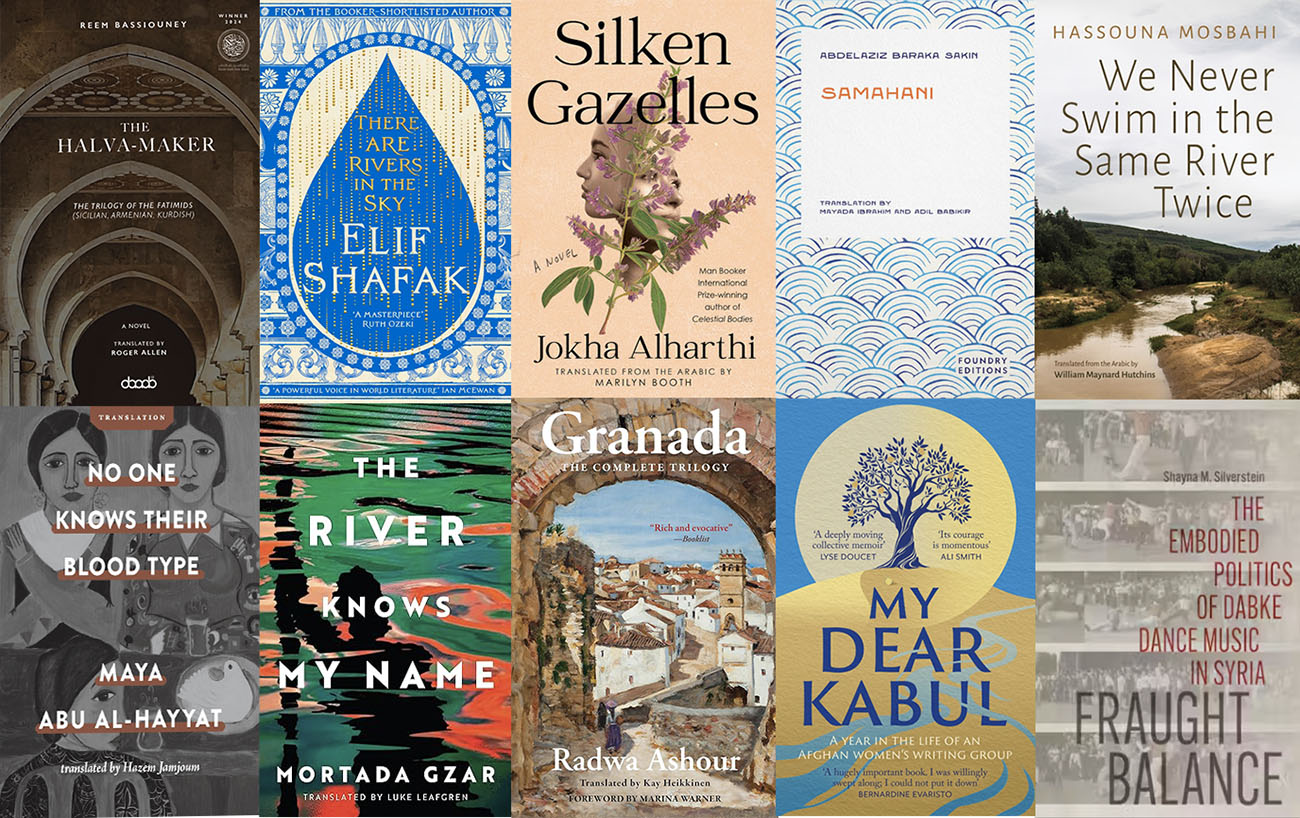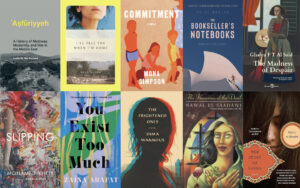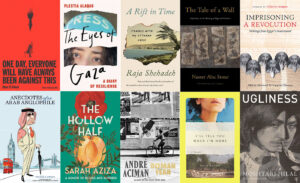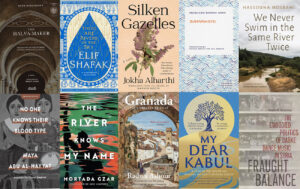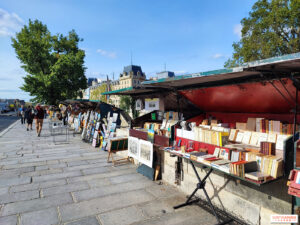With so many fabulous new books to dive into, we've carefully combed through the latest and upcoming releases to bring you a list of 10 must-read titles for this fall.
FICTION
Compiled by Rana Asfour
The Halva-Maker: The Trilogy of the Fatimids (Sicilian, Armenian, Kurdish) by Reem Bassiouney, translated by Roger Allen, DarArab, Aug. 2024
This novel is a real page-turner and yet a tome at nearly 800 pages long. Winner of the 2024 Sheikh Zayed Book Award, this is a historical trilogy about the Shiite Fatimid dynasty in Egypt, with a view to Salah El-din’s role in expelling the Crusaders and establishing the Ayyubids dynasty. Reem Bassiouney delves into topics like sexuality, sadness, loss, war, violence, and famine in the Arab world. I found the novel offered a fresh perspective on the oft-overlooked stories of the men and the potential contributions of the women by their side who influenced the course of Egypt’s history.
There Are Rivers in the Sky, by Elif Shafak, Penguin, Aug. 2024
Elif Shafak’s new book, shortlisted for the Booker Prize, explores the importance of water throughout history. The story follows three characters (Zaleekhah, Narin, and Arthur) affected by a raindrop’s journey from ancient Mesopotamia to modern-day London. This creative storytelling method matches Shafak’s known style, as seen in her previous work, The Island of Missing Trees. Great for fans of immersive, multi-generational stories.
Silken Gazelles by Jokha Alharthi, Translated by Marilyn Booth, Catapult, Aug. 2024
Get ready to be immersed in a captivating love story in award-winning author Jokha Alharthi’s latest novel. Set in 1980s Muscat, the book follows the lives of two Omani women who share an unbreakable bond as nursing sisters. The story opens a window onto Omani history, including the ancient canal system and the once-prosperous pearl industry. Celebrating the resilience and power of female relationships, this novel promises an exhilarating journey through time and tradition.
SAMAHANI by Abdelaziz Baraka Sakin, Translated by Mayada Ibrahim and Adil Babikir, Foundry Editions, Sept. 2024
In a 19th-century setting in Zanzibar, this novel tells the story of the struggles faced by the native Zanzibaris from both Europeans and Arabs. It revolves around the bond between an Omani princess and her eunuch African slave, and sheds light on the hardships and exploitation experienced by the people of the island. The narrative serves as a powerful outcry against persecution in any form.
We Never Swim in the Same River Twice by Hassouna Mosbahi, Translated by William Maynard Hutchins, Syracuse University Press, Sept. 2024
Three friends in Tunisia during the Arab Spring form an unexpected bond. Saleem, Aziz, and Omran connect over drinks and walks on the beach in Bizerte, grappling with the dominance of political extremism in Tunisia. They reflect on their lives and reject Islamist rhetoric and masculinity, questioning their connection to their nation.
No One Knows Their Blood Type by Maya Abu Al-Hayyat, Translated by Hazem Jamjoum, The Ohio State University Press, Oct. 2024
In the wake of her father’s passing, Jumana uncovers a shocking revelation about her own blood type that defies all logic. Against the backdrop of Palestine, this novel explores the intricacies of women’s lives under colonial rule, in a narrative that challenges the status quo, questioning why themes of love, friendship, parenthood, and desire often take a backseat in discussions about liberty and freedom.
The River Knows My Name by Mortada Gzar, Translated by Luke Leafgren, Amazon Crossing, Oct. 2024
The latest novel by Iraqi author and filmmaker Mortada Gzar tells the story of a 15-year-old girl in early 20th century Basra, Iraq, who runs away with her father’s Gospels and a statue of the Baby Jesus. When her father goes missing trying to find her, two women help Charlotte on a quest filled with local stories and self-discovery. The novel explores the power of belief, the desire for freedom, and the joy of self-discovery.
Granada, the Complete Trilogy, by Radwa Ashour, Translated by Kay Heikkinen, AUC Press, Nov. 2024
Radwa Ashour’s trilogy recounts the experiences of those who stayed in Andalusia during the decline of Muslim rule in Medieval Spain. The book spans over a century and follows individuals struggling to maintain faith and hope while facing confiscations, forced conversions, and expulsion. Comprising the novels Granada, Maryama, and The Departure, the trilogy clinched the first prize at the inaugural Arab Woman Book Expo in Cairo in 1995.
NON-FICTION
Compiled by Malu Halasa
My Dear Kabul: A Year in the Life of An Afghan Women’s Writing Group, Atifa, Batool, Elahe, Fakhta, Farangis, Farishta, Fatima, Freshta, Marie, Maryam, Masoma, Mehrsa, Naeema, Najla, Nilofar, Nora, Parand, Rana, Sadaf, Samira and Zainab, Hodder and Stoughton, 2024
The 21 writers in a women’s writing group in Afghanistan relay their anxieties and fears as the Taliban return in 2021. Through messages on their phones to each other that are retrieved and saved in London and then deleted back home, writers on the frontline warn others to destroy or hide their books and papers — any sign of education by women is a danger. The entries record the last documented instances of girls in school before they are sent home for good. The writers of the diary are not asking for pity; they only “want to be seen”— a radical request considering newly enacted Taliban laws that ban women’s voices — and faces — in public.
Fraught Balance: The Embodied Politics of Dabke Dance Music in Syria by Shayna M. Silverstein, Wesleyan University Press, 2024
The dabke, traditionally performed in a line by stamping, jumping, and at times seemingly pirouetting men all over the Middle East, is more than a dance. The academic Shayna M. Silverstein is an astute observer of culture as a prism through which to understand countries and politics. She not only identifies gender hierarchies inherent in the male-only dance but regime authoritarianism as it is performed in Syria. Syrian migrants and refugees outside the country attend dabke workshops, dance in mixed groups, and focus on “self care,” the kind that the poet Audre Lorde championed: “… caring for myself is an act of political warfare.”



